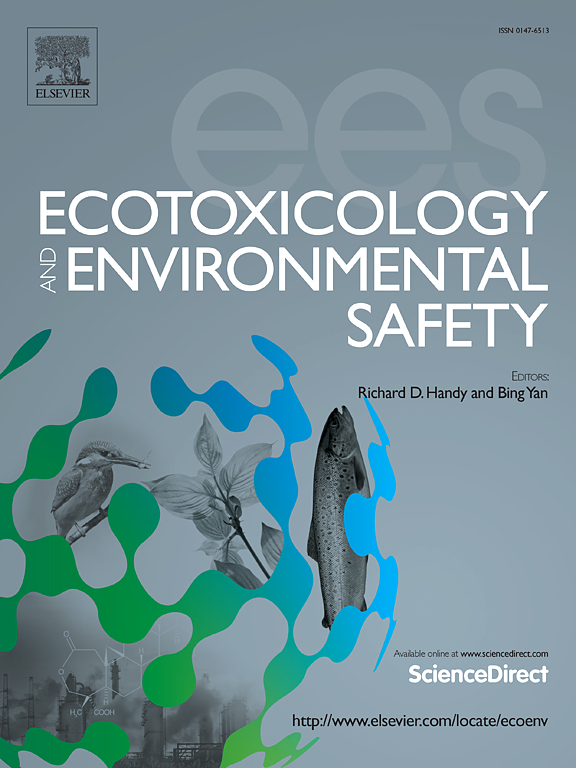产前压力增加后代的学习和记忆缺陷:大鼠海马神经元损伤的毒理学研究
IF 6.2
2区 环境科学与生态学
Q1 ENVIRONMENTAL SCIENCES
引用次数: 0
摘要
最近的流行病学研究发现,产前应激可引起儿童学习和记忆缺陷,但其毒理学机制尚不清楚。目的探讨产前应激对子代学习记忆影响的毒理学机制。方法从妊娠14 ~ 21天开始,采用0、10、40 mg/kg不同剂量的皮质酮(CORT)给药,建立产前应激模型。首先,我们通过神经元损伤、突触损伤和神经递质水平来评估后代海马损伤。通过Morris水迷宫实验检测小鼠的学习和记忆能力,并分析氧化应激和细胞凋亡的生物标志物,探讨其可能的机制。结果CORT诱导的产前应激表现为体重下降、血清CORT升高、食物消耗减少(p <; 0.05)。随着产前应激的增加,后代海马损伤加重,表现为神经元受损,突触蛋白减少,神经递质减少。Morris水迷宫实验中出现学习记忆缺陷,包括逃避潜伏期长、寻找平台的行走距离增加(p <; 0.05)。生物标志物表明学习和记忆障碍的潜在毒理学机制:抗氧化酶(SOD)和T-AOC)降低,促炎细胞因子(IL-6)和细胞凋亡增加(p <; 0.05)。结论产前应激可导致海马依赖性学习记忆障碍,主要表现为神经元丢失、突触损伤和神经递质减少。我们的研究表明,提高母亲的幸福感有助于下一代的学习和记忆发展。本文章由计算机程序翻译,如有差异,请以英文原文为准。
Prenatal stress increases learning and memory deficits in offspring: A toxicological study on hippocampal neuronal damage in rats
Background
Recent epidemiological studies have observed that prenatal stress induced learning and memory deficits in children, but the toxicological mechanisms remain unclear.
Objectives
We conducted a systematic study to explore the toxicological mechanisms of prenatal stress on learning and memory in offspring.
Methods
We established a prenatal stress model by corticosterone (CORT) administration at different dose levels (0, 10, 40 mg/kg) from gestational days 14–21. First we assessed hippocampal damage in the offspring by the neuronal damage, synaptic damage, and neurotransmitter levels. We then detected learning and memory ability by Morris water maze test, and finally we analyzed biomarkers of oxidative stress and apoptosis to explore the potential mechanism.
Results
Prenatal stress induced by CORT administration was indicated by decreased body weight, increased serum CORT and reduced food consumption (p < 0.05). With prenatal stress increasing, hippocampal damage in the offspring worsened, characterized by damaged neurons, decreased synaptic proteins, and reduced neurotransmitters. Learning and memory deficits were observed, including long escape latency and increased travel distance to find the platform in the Morris water maze test (p < 0.05).The potential toxicological mechanisms underlying the learning and memory impairments were indicated by biomarkers: decreased antioxidant enzymes (SOD and T-AOC), increased pro-inflammatory cytokines (IL-6) and apoptosis (p < 0.05).
Conclusion
Prenatal stress leads to hippocampus-dependent learning and memory impairments by neuron loss, synaptic injury, and reduced neurotransmitters. Our study implies that improving maternal well-being is helpful for the learning and memory development of the next generation.
求助全文
通过发布文献求助,成功后即可免费获取论文全文。
去求助
来源期刊
CiteScore
12.10
自引率
5.90%
发文量
1234
审稿时长
88 days
期刊介绍:
Ecotoxicology and Environmental Safety is a multi-disciplinary journal that focuses on understanding the exposure and effects of environmental contamination on organisms including human health. The scope of the journal covers three main themes. The topics within these themes, indicated below, include (but are not limited to) the following: Ecotoxicology、Environmental Chemistry、Environmental Safety etc.

 求助内容:
求助内容: 应助结果提醒方式:
应助结果提醒方式:


